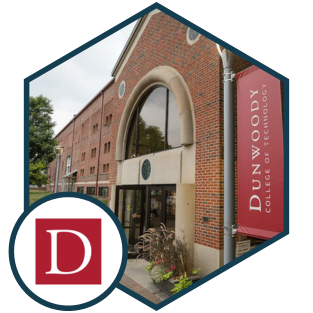The Challenge
Dunwoody College of Technology is a private, not-for-profit technical college located in Minneapolis, Minnesota. Founded in 1914, Dunwoody o ers two- and four-year degrees in programs such as construction sciences, robotics/manufacturing, and computer technology. Administrators’ goal is to make Dunwoody a national leader in technical education.
The college used various software products, a limited homegrown learning management system (LMS), and Moodle, a self-hosted LMS. Michael White, the dean of applied management for Dunwoody, said the college needed to move to a standard, user-friendly LMS that could eliminate redundancy and be “more robust from an assessment perspective and more conducive to distance learning.” The search was on.
“Hands down, Canvas had everything we need—and they’re extremely easy to work with.”
—Michael White, Dean of Applied Management, Dunwoody College of Technology
Key Insights
Dunwoody educators say consistent use of Canvas improves student outcomes.
Canvas has cut grading time for Dunwoody instructors by two-thirds (66%).
Canvas helped Dunwoody instructors standardize their course curricula.
The Solution
In the early spring of 2016, Dunwoody administrators, faculty, and IT began looking at LMS options—one was self-hosted, and the other was the cloud-based Canvas LMS, by Instructure. Dunwoody compared each platform against 50 criteria, rated Canvas the highest, and decided to proceed with a pilot. “Canvas let us play in the sandbox, and we found that Canvas had the big-ticket items we needed in an established LMS,” White says.
Canvas’ tech team and support representatives visited the Dunwoody campus for three days during the pilot phase. During training, a Dunwoody faculty member led his colleagues through the overview, introduction, and course setup and helped facilitate a question and answer session. That faculty member used a Canvas-provided checklist to start building out the LMS.
Dunwoody and Canvas also took a deep dive into outcomes, rubrics, accreditation, and associated elements that could help the institution substantiate students’ progress. Dunwoody is accredited by The Higher Learning Commission and participates in its Academic Quality Improvement Program, and Canvas representatives demonstrated how the LMS could streamline the accreditation process.
White says, “We’d been doing everything by hand and piecing things together. Canvas gave us an easy way to ensure we were
With some platforms, implementation can take a year, but we implemented Canvas in four to five weeks. The turnaround time was impressive, and we learned how easy it is to make the system work. Glitches and issues happened, but overall it was great.
—Michael White
Dean of Applied Management, Dunwoody College of Technology
covering all outcomes, without using a lot of other software products we don’t need.”
Shortly before the fall of 2016, Dunwoody decided to switch to Canvas and transfer courses from its previous LMS. The college completed full implementation by the onset of classes in January 2017.
The Results
Even though Dunwoody College is still relatively early in its Canvas adoption, White says he’s noticed a change in how IT staff is using its time, the ways instructors are teaching, and the ways students are learning.
Dunwoody’s previous LMS didn’t have the ability to interface well with the PowerCampus administration system. That changed with Canvas, and White says that the SIS imports saved time for his tech staff and reduced redundancy for instructors as they built courses and added students. Instructors say adopting Canvas has cut their time grading work by two-thirds. They also received an unexpected benefit in organizing curricula. “We like the ability to link multiple sections to the same course, which helps create an overall standard. That’s a big goal for the school, to say, ‘This is what a Canvas course looks like,’” White says.
Canvas also has the ability to meet the students where they are, giving them quicker response times and the ability to upload assignments and projects in a variety of formats. These changes, big and small, have aided the overall mission of tracking student success and pursuing innovation.
“With Canvas, we see a general improvement in the quality of courses, outcomes, and rubrics. We have a great new ability to monitor those things.”
—Michael White, Dean of Applied Management, Dunwoody College of Technology
Download Case Study
